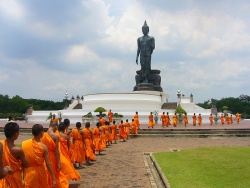Difference between revisions of "Thero"
Jump to navigation
Jump to search
| (4 intermediate revisions by the same user not shown) | |||
| Line 1: | Line 1: | ||
[[File:Phutthamonthon Buddha.JPG|thumb|250px|]] | [[File:Phutthamonthon Buddha.JPG|thumb|250px|]] | ||
| − | '''[[Thero]]''' (Sinhala: ස්ථවිර, also called '''[[Thera]]''', feminine [[form]] '''[[Theri]]''') is an honorific term for fully [[ordained]] [[Bhikkhu|Buddhist monks]] in the [[Sangha|Buddhist monastic order]]. The term '''[[Theri]]''' is used fully [[ordained]] [[Bhikkhuni|Buddhist nuns]]. The terms are derived from [[Pāli]] [[language]] and translate as 'elder and [[Venerable]]'. These terms are used at the end of a [[Monk]] or nun's other names. They are also useful to distinguish [[Buddhist]] [[monastics]] from [[lay people]] ([[Upāsaka and Upāsikā|upāsaka and upāsikā]]) who keep [[Five Precepts|precepts]]. Usage of these terms varies in each [[Schools of Buddhism|Buddhist tradition]]. In [[Sri Lankan]] [[Theravada]] [[Buddhist tradition]], these terms are widely used. | + | '''[[Thero]]''' ([[Sinhala]]: ස්ථවිර, also called '''[[Thera]]''', {{Wiki|feminine}} [[form]] '''[[Theri]]''') is an honorific term for fully [[ordained]] [[Bhikkhu|Buddhist monks]] in the [[Sangha|Buddhist monastic order]]. The term '''[[Theri]]''' is used fully [[ordained]] [[Bhikkhuni|Buddhist nuns]]. The terms are derived from [[Pāli]] [[language]] and translate as 'elder and [[Venerable]]'. These terms are used at the end of a [[Monk]] or [[nun's]] other names. They are also useful to distinguish [[Buddhist]] [[monastics]] from [[lay people]] ([[Upāsaka and Upāsikā|upāsaka and upāsikā]]) who keep [[Five Precepts|precepts]]. Usage of these terms varies in each [[Schools of Buddhism|Buddhist tradition]]. In [[Sri Lankan]] [[Theravada]] [[Buddhist tradition]], these terms are widely used. |
| − | Some prominent theros / theris : | + | Some prominent [[theros]] / [[theris]] : |
* [[Arahant]] [[Ananda|Ananda Thera]] | * [[Arahant]] [[Ananda|Ananda Thera]] | ||
* [[Arahant]] [[Mahapajapati Gotami|Mahapajapati Gotami Theri]] | * [[Arahant]] [[Mahapajapati Gotami|Mahapajapati Gotami Theri]] | ||
| − | * | + | * [[Balangoda Ananda Maitreya]] [[Thero]] |
| − | * Kiribathgoda Gnanananda [[Thero]] | + | * [[Kiribathgoda Gnanananda]] [[Thero]] |
* [[Ayya Tathaaloka|Ayaa Tathaaloka Theri]] | * [[Ayya Tathaaloka|Ayaa Tathaaloka Theri]] | ||
| − | * | + | * [[Gangodawila Soma Thero]] |
* [[Nyanaponika]] [[Thera]] | * [[Nyanaponika]] [[Thera]] | ||
* [[Nanavira Thera|Nanavira Thero]] | * [[Nanavira Thera|Nanavira Thero]] | ||
Latest revision as of 19:11, 23 January 2015
Thero (Sinhala: ස්ථවිර, also called Thera, feminine form Theri) is an honorific term for fully ordained Buddhist monks in the Buddhist monastic order. The term Theri is used fully ordained Buddhist nuns. The terms are derived from Pāli language and translate as 'elder and Venerable'. These terms are used at the end of a Monk or nun's other names. They are also useful to distinguish Buddhist monastics from lay people (upāsaka and upāsikā) who keep precepts. Usage of these terms varies in each Buddhist tradition. In Sri Lankan Theravada Buddhist tradition, these terms are widely used.
Some prominent theros / theris :
- Arahant Ananda Thera
- Arahant Mahapajapati Gotami Theri
- Balangoda Ananda Maitreya Thero
- Kiribathgoda Gnanananda Thero
- Ayaa Tathaaloka Theri
- Gangodawila Soma Thero
- Nyanaponika Thera
- Nanavira Thero
